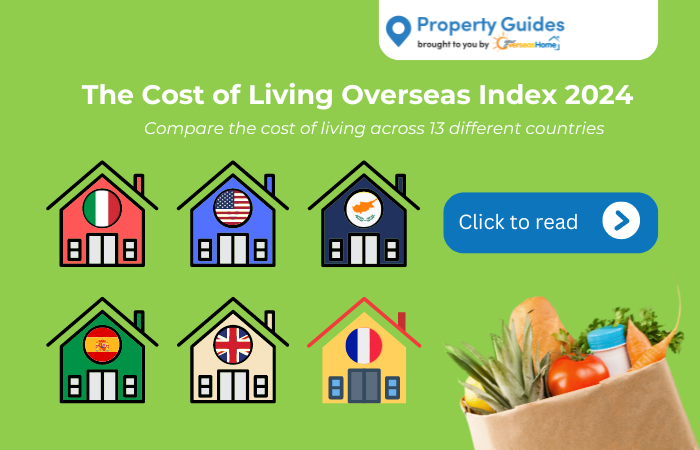If you’re a retired empty-nester thinking about moving abroad, chances are you’re ready to downsize or as some say “rightsize”. Going from a spacious family home in suburbia to a smaller lifestyle property by the sea means a lot to think about. We take a closer look to help you prepare!

Ready to swap your four-bed semi for a two-bed finca?
Get comfortable with your decision
Not only practical, down-sizing is a sensitive matter and involves coming to terms with change. You’re likely waving goodbye to a home you worked hard to own, somewhere you personalised over the years, raised a family and made lots of happy memories. A recent survey by a park home specialist showed just 30% of current empty-nesters in the UK are planning to downsize anytime soon.
The top reason for staying put was having space for their children to stay, but other factors included not wanting to leave the house they’d worked all their life to own and being happy with their neighbours and local community.
Revealingly, on the flip side, 83% of people who have downsized said they were happier for doing so. Having a smaller property to upkeep ranked top, while many enjoyed a fresh start in a new location, as well as saving on their outgoings such as utilities. Truth is, it’s not a bad decision to have to make!
Cash in while you can!
House price growth in post-war Britain has been substantial, especially in recent decades. The UK’s income-to-house price ratio now is more than double what it was in the 1970s. Arguably, no generation has enjoyed the fruits of house price appreciation like today’s home-owning pensioners who got on the housing ladder early.
“Those approaching, or having already reached, retirement age have been some of the biggest beneficiaries of house price growth,” said the head of residential research at Savills Lucian Cook in a recent report.
By moving to a property that better suits their needs, downsizers particularly those in high-value locations – can give themselves retirement funding a significant boost, particularly vital in the face of rising living costs.
All of this makes a strong argument for cashing in now, leaving you time to enjoy your gains by rightsizing and super-charging your pension treating the family, or both. If you move abroad where the cost of living tends to be lower, your money will go even further.

Enjoy the process, it’s for your benefit after all
You’re saving the kids a headache
Financial perks aside, rightsizing while you are still in good health and able to both physically and mentally is doing your loved ones a favour. The process forces you to sort through furniture and personal possessions and get rid of items you don’t want or won’t need in your smaller home. It’s a good time to pass on bits to family members. Above all, you’re saving them the bother of having to sort through everything in the event you’re no longer around or able to. Of course, there’s no reason they can’t be called upon for assistance!
Ensure your planning leaves enough time to complete this. Start talking to international removers in good time and get an idea of how much you will take with you. Remember, it’s usually easier to furnish an overseas home locally, rather than bring everything with you.

Have a plan!
Have a plan – bad timing can be costly
Take things a step at a time to avoid costly mistakes. Don’t commit to purchasing your new home abroad until you’ve sold up in the UK or have a serious commitment from a buyer. Take financial planning advice about organising your move and when to become a tax resident in your new country.
Selling your main UK home after moving abroad could leave you liable to capital gains tax in your new country and/or the UK (double tax treaties mean you shouldn’t pay this twice). In some cases selling up before leaving the UK could still leave you liable to CGT in your new country. This could occur if you sell and relocate within the first half of any given year and you move to a country where the tax year runs from January to December, which is typical in Europe (unlike the UK). Thanks to the 183-day rule, arriving in a country in March or April for example and residing there the rest of the year could make you a tax resident and liable for capital gains incurred at any time during that year. To take any risk of this, sell up in the UK when it suits you but don’t move abroad until the second half of the year to mitigate tax liabilities.

The Spanish island of Majorca could be a fine place to call home
Head to the Med for better-value beach homes
Need reassurance about rightsizing to Europe or a Mediterranean destination? The typical retiree’s wish list of being within walking distance of a beach, sunny promenade, shops and amenities will be more achievable and cost you less compared to the UK. Lower prices mean you might not be limited to an apartment too, with townhouses or character village homes very affordable in much of Europe.
In popular expat destinations, you have the option of being within a development or community geared towards lifestyle users. These could include communal amenities such as swimming pools, gym and Spa, tennis, clubhouse with bar/restaurant and golf. You’ll never be bored!

Invite true friends over to visit
You won’t miss the old neighbours!
Pick your location carefully and you’ll have a diverse group of new friends in no time. It’s not only British people who retire to Europe, with other northern Europeans, including Scandinavians, French, Belgians, Dutch and Germans, enjoying their golden years in popular resorts around the Med. More recently, Americans have started buying homes in Europe too. This diversity and community-spirited environments make for a great and enriched social life, especially as English is often the common language!



